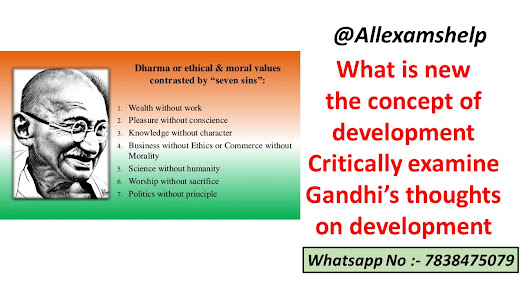The concept of development has evolved over time and continues to do so as our understanding of society, economics, and politics changes. In the past, development was primarily focused on economic growth and industrialization as a means of improving living standards in developing countries.
However, this
narrow approach has been challenged in recent decades, with a growing
recognition of the importance of social and environmental factors in
sustainable development.
What is new the concept
of development Critically examine Gandhi’s thoughts on development
Sustainable
development: This approach emphasizes the need to balance economic, social, and
environmental goals in order to meet the needs of present and future
generations.
Human
development: This approach focuses on improving people's well-being through
measures such as education, healthcare, and social inclusion, rather than
solely focusing on economic growth.
Participatory
development: This approach emphasizes the importance of involving local
communities in the development process, ensuring that they have a say in
decisions that affect their lives.
Post-development:
This approach challenges the Western-centric idea of development and emphasizes
the need to move beyond traditional development paradigms in order to create
more equitable and sustainable societies.
Overall, these
newer concepts of development represent a more holistic and inclusive approach
to development that takes into account a wider range of factors beyond just
economic growth.
Mahatma
Gandhi's thoughts on development were centered around the idea of
self-sufficiency and sustainability. Gandhi believed that development should
not be equated with industrialization, modernization, or urbanization, as these
concepts could lead to a dependence on imported goods, a disregard for the
environment, and an increase in social and economic inequality.
Gandhi's vision
of development was rooted in the idea of "Gram Swaraj," which
translates to "village self-rule." He believed that development
should start from the grassroots level and that each village should be
self-sufficient in terms of its basic needs such as food, water, clothing, and
shelter. Gandhi argued that this approach would not only lead to greater
economic and social equality but would also create a sense of community and
promote a sustainable way of life.
However, while
Gandhi's ideas were laudable in their intent, they have also been criticized
for their impracticality and lack of scalability. Critics argue that Gandhi's
vision of development may have worked in his time, but it is not applicable to
today's complex and interconnected world. The rapid pace of technological
change and globalization has made it difficult for villages to be
self-sufficient, and many argue that the only way to achieve economic growth is
through large-scale industrialization and urbanization.
For SOLVED PDF & Handwritten
WhatsApp No :- 7838475019
Moreover,
critics point out that Gandhi's approach may not be effective in addressing the
structural problems of poverty and inequality. While self-sufficiency may
improve the standard of living in individual villages, it may not address the
underlying causes of poverty and inequality, which are often rooted in broader
economic and political systems.
In conclusion,
while Gandhi's vision of development has its merits, it is not a
one-size-fits-all solution to the complex challenges of economic development.
His ideas on sustainability and community-based development are still relevant
today, but they need to be adapted to suit the realities of the modern world.
